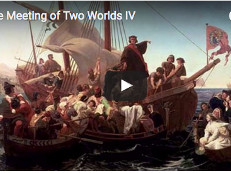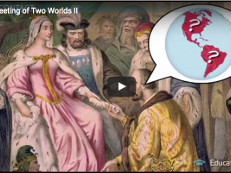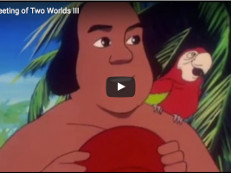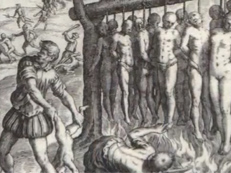After having watched “The Meeting of Two Worlds”, I began to scour the internet for some reasons for and against Columbus’ exploration as I was quite perplexed by the two questions posed in the middle of the lecture, the first one being “what impressions did you have of Columbus before you looked at his account?”.Continue reading “week 2: the meeting of two worlds”
Posted in Blogs, Week 2 | Tagged with 1492, colonialism, Columbus
After watching the lecture I have understood that there are many thoughts and opinions regarding Christopher Columbus’ “discovery/conquest”. We try to fit this event in a good or bad box when in reality this event is quite complex. When I first learned about Columbus, I learned that he accidentally discovered a Western Island and thought […]
Posted in Blogs | Tagged with Columbus, Poma
This lecture video talked about a number of important factors all relating to history and slavery.
I learnt that Indigenous populations plummeted because of violence and them having been turned into slaves or killed in the 1800’s following Christopher Columbus. Additionally, all the black slaves- 10 million slaves forced across to work in Africa. I know this perspective (African perspective) because of having learnt this in my high-school history class back in Kenya. A lot of detail was shared with us then on how difficult the situations for slaves had been, most slaves did not even make it back to Africa because of the kind of conditions that were present on the boat, for instance, they were all forced to sleep and defecate in the same small space of the boat which leads to tons of slaves falling sick, and if they did fall ill they would be thrown off the boats. This was one of the biggest coerced movement of people in history. Because of Christopher Columbus, the population (Amerindian populations) had been reduced by 90% because of the killings and the total invasion of diseases.
At this time Africa had one of the weakest concepts of social identity and because of this reason, they had been targeted by the Europeans and the Americans to be taken and coerced for labour. After Lincoln had advocated for the emancipation of slave ideas such as pan-Africanism had begun to come into place. 1888 slavery was abolished but slaveries legacies are still with us even today. I found it interesting to see how there had been different dates for the abolishment of slavery around America but 1888 was the final date that slavery was abolished.
I question why the slaves were always African however because for some cases it would have been cheaper to have enslavement of Europeans or Americans instead of having to ship African slaves to remote areas.
Today a lot of people deny the fact that racism is absent when in fact it is present almost everywhere but I ponder on why we are always living in the past. As a Kenyan, I’ve heard other Kenyan’s speak about the horrible conditions that our people went through during times of colonisation and this is a constant topic that keeps coming up- but how much longer are we going to keep blaming slavery and blaming Americas/Europeans for the past. We can no longer live in the past- we must live in the future and start overcoming whatever setbacks faced and we must stop playing this “blame game.”
Posted in Blogs | Tagged with 1800, africa, colonisation, Columbus, european, Lincoln, pan africa, republics, rights, slavery
This lecture video talked about a number of important factors all relating to history and slavery.
I learnt that Indigenous populations plummeted because of violence and them having been turned into slaves or killed in the 1800’s following Christopher Columbus. Additionally, all the black slaves- 10 million slaves forced across to work in Africa. I know this perspective (African perspective) because of having learnt this in my high-school history class back in Kenya. A lot of detail was shared with us then on how difficult the situations for slaves had been, most slaves did not even make it back to Africa because of the kind of conditions that were present on the boat, for instance, they were all forced to sleep and defecate in the same small space of the boat which leads to tons of slaves falling sick, and if they did fall ill they would be thrown off the boats. This was one of the biggest coerced movement of people in history. Because of Christopher Columbus, the population (Amerindian populations) had been reduced by 90% because of the killings and the total invasion of diseases.
At this time Africa had one of the weakest concepts of social identity and because of this reason, they had been targeted by the Europeans and the Americans to be taken and coerced for labour. After Lincoln had advocated for the emancipation of slave ideas such as pan-Africanism had begun to come into place. 1888 slavery was abolished but slaveries legacies are still with us even today. I found it interesting to see how there had been different dates for the abolishment of slavery around America but 1888 was the final date that slavery was abolished.
I question why the slaves were always African however because for some cases it would have been cheaper to have enslavement of Europeans or Americans instead of having to ship African slaves to remote areas.
Today a lot of people deny the fact that racism is absent when in fact it is present almost everywhere but I ponder on why we are always living in the past. As a Kenyan, I’ve heard other Kenyan’s speak about the horrible conditions that our people went through during times of colonisation and this is a constant topic that keeps coming up- but how much longer are we going to keep blaming slavery and blaming Americas/Europeans for the past. We can no longer live in the past- we must live in the future and start overcoming whatever setbacks faced and we must stop playing this “blame game.”
Posted in Blogs | Tagged with 1800, africa, colonisation, Columbus, european, Lincoln, pan africa, republics, rights, slavery




